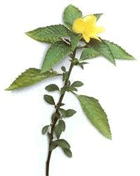
Damiana
Introduction
This fact sheet provides basic information about Damiana. Damiana is a yellow-flowering plant that is frequently found growing in climates that are relatively hot and humid including Central and South America and in a few regions in the United States. Damiana was traditionally used as a respiratory, neurological, and sexual medicine by indigenous cultures of Mexico. Commercially introduced in the United States in 1874, damiana was marketed as an aphrodisiac and has been claimed to induce euphoria, as well as to help people with depression.
Common Names
Damiana, Herba de la Pastora, Mexican Damiana, Old Woman's Broom, Rosemary (not to be confused with the spice Rosmarinus officinalis L.)
Latin Names
Turnera diffusa
What It Is Used For
- Today, damiana has found its way into a number of herbal OTC products, in particular those claiming to induce a legal herbal "high."
- In the Caribbean, damiana leaves are boiled in water and the vapors inhaled for the relief of headaches.
- Teas are said to aid in the control of bed wetting.
How It Is Used
Damiana today is conventionally made into a tea. In herbal medicine, damiana is used to treat conditions ranging from coughs to constipation to depression. The herbal supplement is reputed to help with Fibromyalgia, energy, emphysema, low estrogen, frigidity, hot flashes, impotency, infertility, menopause, Parkinson's disease, PMS, inflammation of prostate, Lou Gehrig's disease, and more dealing with reproductive organs in both males and females.
What the Science Says
- No substantive data is available to support the aphrodisiac effects of damiana. Although it has been postulated that the plant may contain the central nervous system stimulant caffeine, the aphrodisiac effect has not been attributed to any specific components. The volatile oil in damiana might be sufficiently irritating to the urethral mucous membranes to account for its so-called aphrodisiac effects. Despite containing a complex mixture of components, there is no evidence to support claims for an aphrodisiac effect.
- There are no recent clinical studies of damiana that provide a basis for dosage recommendations, though it has been studied in combination with other agents. Classical dosage of the leaf was 2 g.
- Despite containing a complex mixture of components, there is no evidence to support claims for a hallucinogenic effect.
Side Effects and Cautions
- No significant adverse effects have been reported in the literature. However, persons claiming to experience damiana-induced hallucinations should be monitored closely and the possibility of ingestion of other drugs should be considered.
Sources







